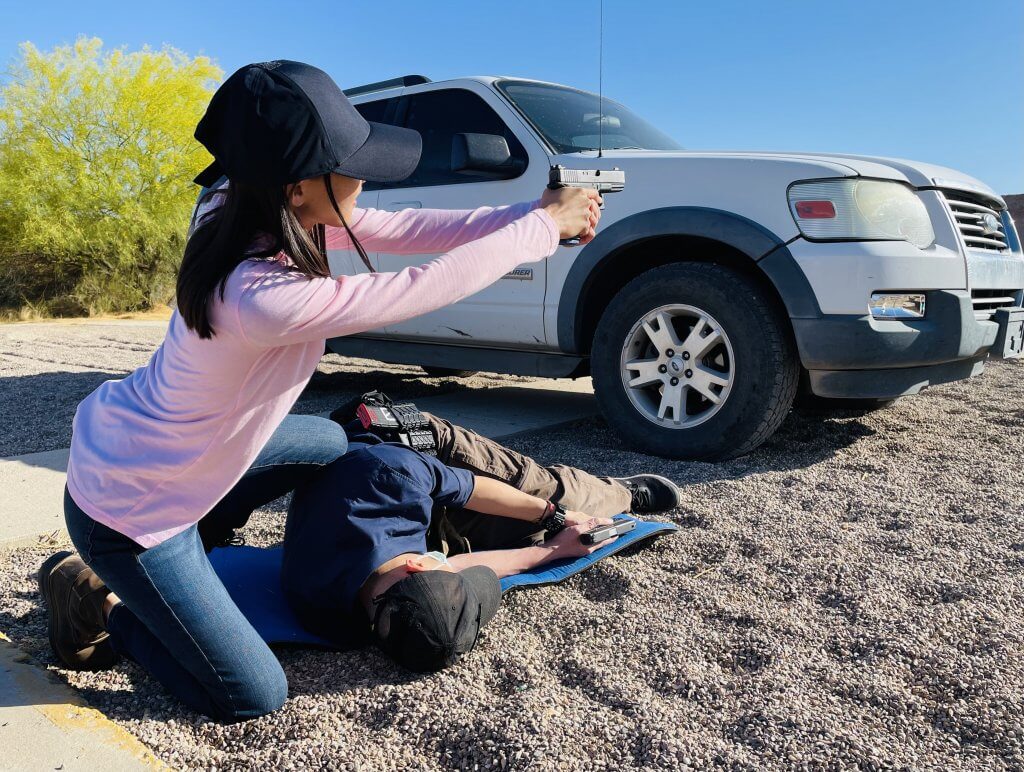Melissa Brown Eyes
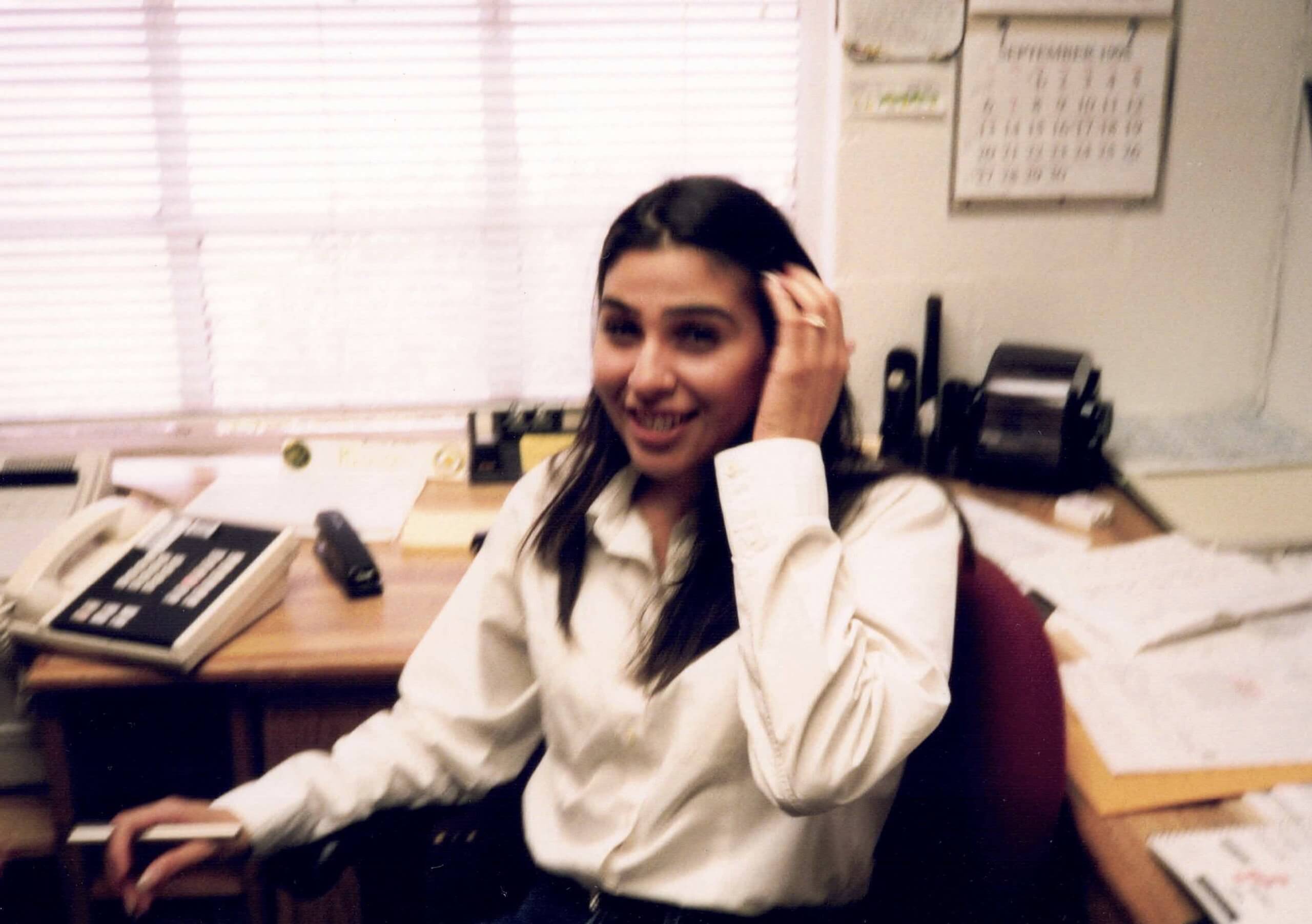
There are no people left from those old times now, except me, and an old man living up at Fort Apache, who was raised as if with me. He went on the first raiding party that I ever went on. Besides us there are two women left from those times and they are Her Eyes Grey and her sister, Her Eyes Brown.”
–Palmer Valor, 95+ year old White Mountain Apache, in 1932
The Patrol Agent in Charge (PAIC) of my old station had two admin assistants, both named Melissa. To avoid confusion, we got in the habit of referring to one as “Melissa Green Eyes,” and the other as “Melissa Brown Eyes.” Like “dot” versus “feather,” only sexist, rather than racist. Both Melissas were Latin.
They were both lovely. Melissa Green Eyes was cute; adorable in a perpetually smiling girl-next-door kind of way.

Melissa Brown Eyes was a sultry morena; slim and leggy in a Madeline Stowe kind of way.
I gave both Melissas a wide berth. I was recently (and now still, after three decades, quite happily) married. Border Patrol Stations had even more testosterone than fire stations, especially in those days. Each Melissa was single at the time, and had more than enough single suitors sniffing around like over-eager puppies.
I didn’t have problems getting along with female coworkers–quite the opposite, in fact–and neither Melissa was aloof or unfriendly, but I deemed it best for my fledgling career in federal law enforcement to steer well clear of them.
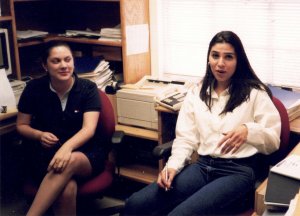
I rarely had much need to be in the bosses’ office anyway, unless I was getting chewed out by the Assistant PAIC, or struggling with a supervisor (yet again) to rearrange the schedule. I was new, and as a matter of course, newer agents weren’t given weekends off when the schedule for the upcoming pay period was drafted. Trans-national crime in the border region never takes a holiday, but I needed one weekend a month to drill with my AF Reserve unit in San Antonio.
Each of the main rooms in our tiny station had a radio tuned to our frequency, so no matter where you were, you could track what was going on along the River (and in the rail yards, and up on the King Ranch, and all the other areas we patrolled). The Melissas could hear our chatter on the radio as they went about their admin duties.
There weren’t that many of us. Our old station had been built for 20 agents; we had about 60 when I got there in ’96. We were all pretty tight.
One of the greatest hazards to the mental well-being of law enforcement officers is a sense of isolation from the people and communities they give so much to serve. Some of this had always been inevitable. It’s the result of daily traumas not experienced nor understood by the community at large, as well as the professional distance that must be maintained. A doctor, after all, cannot get too close to her or his patients emotionally, without risk of compromising professional objectivity.
So even before the media portrayed law enforcement organizations as occupying armies, driving a wedge between them and the communities they serve, cops and their families have always gotten along best with other cops, and their families. Support staff are part of that family. Most of us hung out off duty as well as on.
There were fewer female agents in those days. Both Melissas got along well with them, and had a particularly close bond with Agent Susan Rodriguez, who was married to Gil, another of our agents. Susan and Gil had a baby girl, Megan. If memory serves Melissa Brown Eyes had played a prominent role in planning and executing Susan’s baby shower.
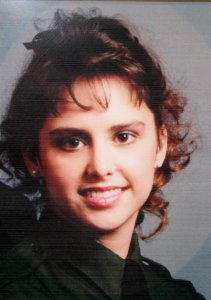
In July of ’98 there was a horrific gun battle. Ric Salinas, a rookie about 6 months out of the Academy, and Susan Rodriguez were shot and killed.
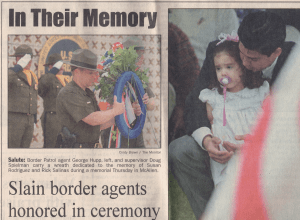
Several months after that, Melissa Brown Eyes told me, with a beaming smile, that she’d been accepted into the Border Patrol Academy as an agent trainee.
I didn’t know she had applied. I congratulated her, but then it blurted out—
“Are you out of your mind?”
Both Melissas already had steady jobs and promising futures in the federal civil service. They could’ve topped out as GS-12 or maybe even -13 intel analysts. It was one thing to give up that cushy air conditioned day job for the sweat, mosquitoes, back-to-back rotating shifts, and exhaustion of patrol work, before Susan and Ric got killed.
After that, the risks were all too real.
“George,” Melissa replied, with a sad yet determined look,
“When you guys were in that gunfight, I could hear you on the radio, but I couldn’t do a thing to help.
I’m going where I can help.”
And she did.
Melissa Brown Eyes graduated from the Border Patrol Academy–one of the most arduous in federal service–and served with distinction as an agent.
Melissa Green Eyes is no longer an admin assistant either. She has also spent her lifetime serving. Green Eyes married one of our young agents, and must’ve supported his career well; he wound up very high in the food chain of the Patrol.

Brown eyes married an agent too, so she did double-duty.
I admire both of them. Being a spouse is the toughest job in law enforcement, one I’ve addressed in another Personal Heroes post. But I am particularly humbled by WHEN Melissa Brown Eyes made her decision to become an agent.
Most of us who join the military or law enforcement as guardians of our nations and communities have some romanticized notions about glory in battle, at least until we find ourselves in one.
Melissa had none of those.
She knew damn well what she was getting into.
She did it anyway.
